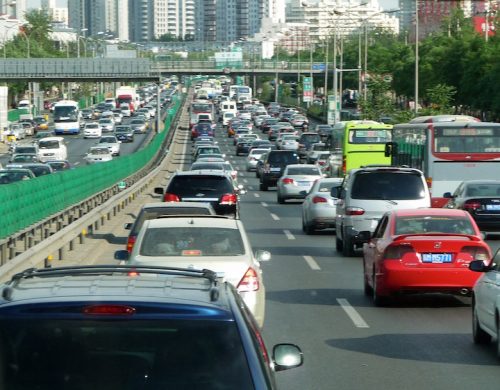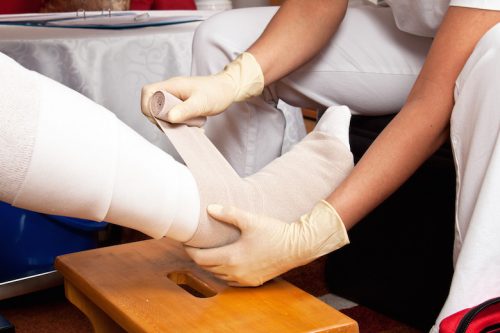How Lymphedema Happens
What Lymphedema Is
In the simplest terms, Lymphedema happens when there is more fluid and protein in an area of the body than can be carried away effectively by the lymphatic system, resulting in a backup that we call swelling. (Click here for a detailed description about how the lymphatic system works.)

This is similar to when traffic gets gridlocked downtown at 5 PM when everyone is trying to get out and use the freeway system to get back to the suburbs. The freeways can only accommodate so many cars at once, so there is a backup of traffic.
Lymphedema is Congestion
As in traffic congestion, lymphatic backup (congestion) can be further complicated by other issues. In heavy traffic, for example, collisions can happen which further slow down the return of commuters to the suburbs.

In addition to these wrecks on the highways, imagine what it would be like if there were failures to major parts of highway infrastructure – like key bridges collapsing.
Collapsed infrastructure causes further traffic jams just like damaged (or missing/malformed) lymphatics cause backed up lymph that results in swelling.

This is what happens in lymphedema when there is fluid backup. Everyone is stuck in the city trying to get home, but there are very few, small functional routes (backroads) to get them there. So, people end up just sitting and waiting clogging up the roads.
Lymphedema is When
Fluid Goes Crazy

In Lymphedema, when protein molecules get stuck in the interstitium (space between the cells) and can’t get back out via the lymphatic system, more fluid (also containing protein) rushes out of the circulatory system (blood/heart) to join it.
This is like people looking out of their office windows and seeing total gridlock, yet rushing to their cars and driving on the sidewalks and through the medians so that all possible space is congested.
Think That’s Bad?
It Gets Even Crazier
Going along with this analogy, imagine that neighboring cities started airlifting cars into the gridlocked city and started piling them up on top of the existing gridlocked cars, building higher, and higher, and higher.
The volume of cars keeps increasing, but there is still nowhere for them to go. This is similar to how arms and legs become swollen.

There’s constant transport of fluid and protein to the affected area, but there is no way to get out. The more protein that is there, the harder the body works to bring more fluid to the area – and that fluid has more protein.
What Does That Look Like Under the Skin?
A new technology called IC Green Lymphography allows a look at the lymphatics by injecting a special fluorescing dye at the end of an extremity (fingers or toes) and watching it being taken up by the lymphatic system.
In a healthy lymphatic system, nice clear channels (roads) are visible. In a limb with lymphedema, the dye will back up and pool in an area that is not draining well.
Here is a video showing ICG Lymphography.
Infrastructure Breakdown
The longer the cars are stuck in gridlock and the harder the city works to move them back to the suburbs, the more that the roads become broken down and riddled with potholes until they are no longer functional. In the lymphatic system, this shows up as valves that fail to close to keep fluid from moving back toward the swollen area, and the inability for the lymphatic vessels to contract to help propel fluid in the right direction.
The city is still hard at work trying to remove the cars from the roads, and as it does so, it tries to make permanent repairs to the roads using stronger materials.
Fibrosis Sets In
In the lymphatic system, this is somewhat similar to fibrosis, or the creation of thick scar tissue. This is what causes the tissue of an affected area (usually an arm or a leg) to harden permanently. In addition to the fibrosis, the body lays down layers of fat which results in a condition unique to lymphedema called “fatty fibrosis.”
Treatment
The good news is that there is treatment for lymphedema. Complete Decongestive Therapy is a series of steps to restore the body to a more normal state.
It involves three steps 1) Manual Lymphatic Drainage (MLD) or Electro-Lymphatic Therapy 2) Compression Bandaging and 3) Garment Fitting for long-term wear garments.
In recent years, new supermicro surgeries have begun to be developed to treat lymphedema. While to some degree experimental, these surgeries have been helpful for a number of people. They are not, however, considered a complete cure for everyone. Some people have amazing results, others get improvement, and other people get little change. This depends to a large degree on how long a person has had lymphedema, genetic factors that govern lymphatic vessel growth, the particular surgery used, and so on.
Liposuction for lymphedema is a treatment that can help reduce hard fatty fibrosis. This is properly referred to as Suction Assisted Protein Lipectomy (SAPL). Like supermicro surgeries to treat lymphedema, the SAPL procedure has varying results from one individual to the next. While neither is a guarantee, surgeons are getting better by the day with modifying techniques, and success rates are going up. Please get a consult with a supermicro surgeon or surgeon who specifically does liposuction for lymphedema as most plastic surgeons are not trained in this specific sub-discipline.

Where to Get Help

Make an appointment with Pain & Swelling Solutions using the link above. In addition to treatment, you will have the opportunity to learn a ton about lymphedema and how to manage it.
Visit our Resources Page to find out what organizations and books could help you.
Take a look at my Educational Info Page for more detailed information about what Lymphedema is.



